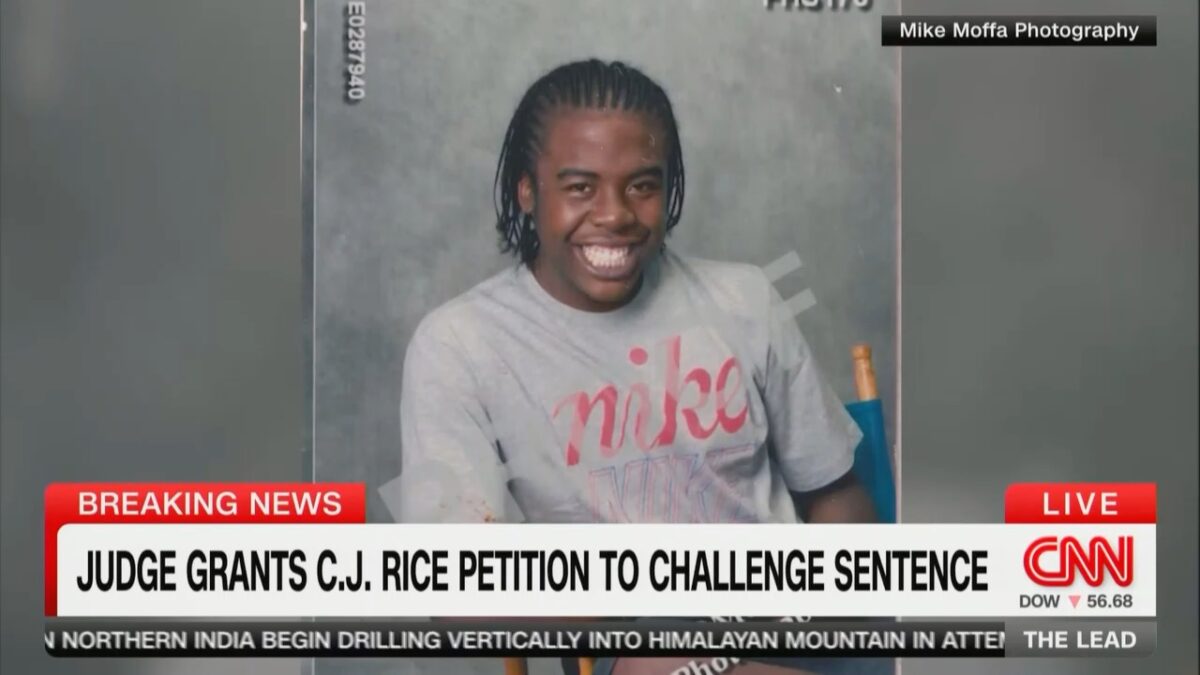Jake Tapper Shares Brutal Lessons He Learned Helping Wrongfully Convicted Man Overturn His Sentence: ‘Once You See It, You Can’t Unsee It’

Screenshot via CNN.
Back in 2011, a teenager named C.J. Rice was very lucky to be treated by pediatrician Dr. Theodore Tapper, because that chance encounter led to the more-than-decade-long effort that helped Rice overturn his attempted murder conviction. That luck was defined by two key elements: Dr. Tapper’s unwavering support for his patient, and the advocacy of Dr. Tapper’s son, CNN anchor Jake Tapper.
But, as Jake Tapper told Mediaite in a phone interview this week, the fair administration of justice shouldn’t require the intervention of a cable news anchor, and his involvement in Rice’s case showed him how there were “probably a million” more prisoners like him.
Tapper wrote a detailed profile of Rice for The Atlantic in October 2022, describing how the then-17-year-old “had been shot while riding his bike, in what he believed was a case of mistaken identity,” and then went to see the pediatrician who had cared for him since he was a baby for follow-up treatment after surgery for grievous injuries he suffered, including an incision down the length of his torso that required more than two dozen staples to close, a fractured pelvis, ongoing infection issues, and bullet fragments that surgeons were unable to remove:
After his discharge, Rice was in severe pain and could barely walk. He needed help to get dressed in the morning and help to go up and down stairs.
When Rice arrived at my father’s office, the wound was still stapled together. Rice slowly lifted himself onto the examination table and winced as he laid himself down. When the exam was over, he slowly pushed himself back up. My father recalls Rice walking out of the office bent over and with short, choppy steps, like an old man.
“The timing of that visit is significant,” Tapper wrote, because Rice would end up being accused of being involved in a shooting six days later on September 25, 2011, that left four people wounded. The alleged perpetrator was described by one of the victims as running away from the scene of the crime — an impossible act at the time for Rice.
As Dr. Tapper described Rice’s condition at the time of the September 25 shooting, “I don’t think it would have been physically possible” for him to have been the gunman. “He could not have run away.”
No guns were ever recovered regarding the September 25 shooting. There was no physical evidence tying Rice to the crime, and his godmother and her family were all willing to give statements he had been at her home during the entire day of the shooting. Rice turned over his cell phone, assuming that the location data would confirm he was nowhere near the scene.
Rice had a court-appointed attorney, Sandjai Weaver, to handle his defense, and as Tapper reported, she made multiple strategic errors that seem mind-boggling in retrospect. Weaver passed away in 2019 so cannot offer any explanations, but she failed to push to get pre-trial statements from alibi witnesses, review medical records showing Rice’s still far-from-healed wounds, pursue the cell phone data, etc. A criminal defense attorney armed with this sort of exculpatory evidence might have been able to get the charges dropped before trial; at minimum, it seems shocking that Weaver failed to aggressively emphasize these multiple strong defenses at trial.
The issue, Tapper argued, is the woefully low pay Philadelphia — and far too many other jurisdictions — provide for court-appointed attorneys who are needed to take on the case overload the public defender’s office cannot handle, with low flat fees that are rebuffed by experienced attorneys and “create a perverse incentive,” because “[w]hether attorneys spend 10 hours preparing for trial or 10,000 hours, they’ll be paid the same small amount. It’s in their interest to maximize their caseload and minimize their prep time.”
At the time she took on Rice’s case, Weaver was mired in massive financial problems, declaring bankruptcy less than a year before and scrambling to meet the terms of a court-ordered payment plan.
In the 14 months before the trial, she met with Rice only twice, each meeting less than 15 minutes, and rarely was reachable by phone. Tapper’s article goes into detail on how Weaver seemed egregiously unprepared at trial, failing to have read crucially important documents and missing key lines of questioning.
Meanwhile, prosecutors were putting together a “gang-feud” theory that Rice and a friend had committed the September 25 shooting as vengeance for the earlier shooting that had wounded Rice so badly. They never had admissible evidence that Rice or his friend were in a gang so this normally would be the sort of prejudicial evidence to which a competent defense attorney could block with a timely objection — but again Weaver failed her client.
He was convicted by the jury and sentenced to 30 to 60 years in prison.
This week, Rice finally got a chance at the justice he was denied at his trial, when a federal court in Pennsylvania granted a writ of habeas corpus (a legal motion in which a prisoner argues they are being wrongfully held) to Rice finding that his “trial counsel rendered ineffective assistance” to a degree that violated his constitutional rights.
This essentially unwinds the trial and conviction, giving prosecutors 180 days to decide to either allow Rice to go free or to have a new trial. The court order imposes a 180-day deadline.
“Even though the case has been overturned,” Tapper told Mediaite, Pennsylvania “has six months to decide whether they want to retry him or free him — that’s how messed up our legal system is.”
He did have some optimism in the fact that a division of the Philadelphia District Attorney’s Office and two different judges had now said that after reviewing the evidence in Rice’s case, “you’re right, he didn’t get adequate representation, and his Sixth Amendment rights were violated.”
“That almost never happens, which is a shame, because it probably should happen much more,” said Tapper, “The legal system exists to protect itself. So honestly, it’s huge for the assistant district attorney and these two judges to be willing to take the time and look and say, you know what, our system failed this young man. And that’s big. And I give them all the credit in the world for acknowledging it.”
The case now goes back to a Pennsylvania state court, where a judge will schedule a status hearing. Moving forward, Rice will not be left to fend for himself or with an inadequate court-appointed attorney. He is being represented by Karl Schwartz, an experienced defense attorney whose legal bills Tapper said he was “100% sure” that his father, who testified in Rice’s defense at his trial and has stayed in touch with him during his years of imprisonment, was paying.
“My dad is a big believer of giving charity anonymously,” said Tapper, “so he will not acknowledge that he is paying” Schwartz’s legal bill. (Judaism, like many faith traditions, places a special value on anonymous charity.)
“I hope and pray and feel fairly confident that they’re going to let him go,” said Tapper about the D.A.’s Office, “but until they do so, I can’t say that they’re going to do so.”
Tapper told Mediaite that he was inspired to get involved in the case by his father, who has practiced medicine “in a lower income neighborhood in Philadelphia for quite some time,” and his father was “not naive” about the realities of many of his patients’ situations, but “was just very convinced from the very beginning that there’s no way [Rice] could have done this just on a physical level.”
“He just didn’t think he could run,” Tapper added. “He saw him days before and he just could barely walk, much less run.” The elder Tapper wrote letters on Rice’s behalf, supporting him during the appeals process, getting frustrated over and over again.
Tapper said that originally his father was reluctant to have him involved as a journalist, under the reasonable belief that media attention isn’t always helpful, but when Rice’s appeals seemed exhausted, it seemed worth the risk. Tapper initially posted a Twitter thread about Rice’s case that got a lot of attention, but he later deleted because he “got a couple of the facts wrong,” and then he pitched the story to several media outlets, ultimately writing the long article for The Atlantic that went viral and brought a massive national spotlight to the story.
According to Tapper, he worked from 2020 to 2022 on the article, interviewing Rice and other key people involved, reviewing records, until he had “an exhaustive piece of work” on Rice’s case. He effusively praised not just his own network, CNN, for covering the story, but other media outlets as well, including CBS This Morning.
“I really give them a lot of credit because, you know, when you do a story like this, when you’re a TV reporter, there is an impulse to not — if you’re if you’re with a rival network — to not carry it because you don’t want to give credit to that other reporter,” he said, adding that he gives “a lot of credit to Gayle King’s team, including her executive producer Shawna Thomas, for having him and his father on the show, and doing an update after the court ruling overturning the conviction.
“It really goes to the fact that they care. They care about the story, and they care about criminal justice, and they really mean it. It showed a lot to me. You know, I mean, obviously CNN cares, and they care about me, and they care about the story, and it’s wonderful, but I’m one of theirs.”
“I don’t want to belittle the support I’ve gotten from CNN,” he emphasized, but the fact that CBS had helped amplify the story was “very journalistic and it’s also very collegial — there isn’t a lot of that in our business, and I just really want to give them a shout out.”
When asked about what he hopes people will learn from Rice’s story, and what reforms are needed, Tapper was blunt about how extraordinarily rare Rice’s outcome was for far too many people entangled in our criminal justice system.
“First of all, there are probably a million C.J.s in prison,” said Tapper. “We have more people in prison per capita than I think any other Western country. And C.J. — I’m not saying he’s lucky — but C.J. happened to have a pediatrician who stood by him and was dedicated to him in my father, who happened to have a journalist son and a lot of C.J.s out there don’t have that.”
It’s “naive” to think that there aren’t “a lot of issues” with our system, Tapper continued, and “once you see the injustices in the system — and I know you know this, but a lot of people who don’t need to understand this — once you see it, you can’t unsee it.”
The prosecutors “would never have brought this case against” him or one of his children, Tapper argued, given the same facts and evidence.
“The cops wouldn’t have arrested me. The D.A. wouldn’t have charged me, period. Never,” he said. “And if they did, I could have afforded a lawyer. I would have been able to afford a lawyer that would have gotten the case dismissed.”
He made sure to highlight the “big difference between public defenders, who are generally really good and dedicated and court-appointed attorneys who are often very overworked, not necessarily the most qualified, and get paid very, very little, so they have to take on more cases than they can usually manage.”
Tapper acknowledged there was “probably not a lot of sentiment in the public” for increased funding for this, but still argued that “what we honestly need, in order to have the kind of system we want to believe we have already” is to fund larger public defenders office budgets, or pay court-appointed attorneys more, or require private attorneys in private firms to take on more pro bono clients, “because the system, as we have it right now, does not provide incentives for the people without means to have even basic adequate representation.”
The current legal standard for what constituted “adequate representation” was laughable, Tapper said, and usually when an appeal attempts to shine a light on even errors as bad as Weavers, “courts look away and say, ‘tough shit,'” noting Supreme Court rulings finding that an attorney could fall asleep, be drunk or high, be found to be mentally ill, “and they’ll say that’s still adequate representation.”
“If we really want to be the nation that we imagine we are,” Tapper concluded, “in terms of all people being created equal and having a court system where we make sure that people have adequate representation, we need to be making sure that if you cannot afford an attorney, one will be provided for you” — the promise enumerated in the Sixth Amendment — but right now we were still “very, very far” away from that ideal.



